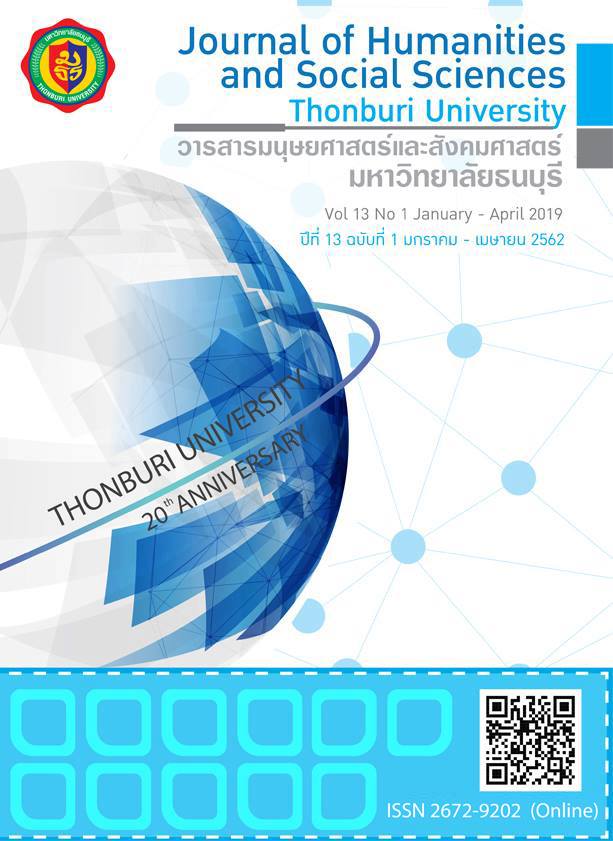การสร้างพื้นที่ของผู้สูงอายุเพื่อยังคุณประโยชน์ด้านเศรษฐกิจและสังคม
คำสำคัญ:
การสร้างพื้นที่, ผู้สูงอายุ, ประโยชน์ด้านเศรษฐกิจ, ประโยชน์ด้านสังคมบทคัดย่อ
บทคัดย่อ
บทความเรื่องการสร้างพื้นที่ของผู้สูงอายุเพื่อยังคุณประโยชน์ด้านเศรษฐกิจและสังคม ใช้วิธีการวิเคราะห์ข้อมูลจากเอกสารทุติยภูมิ (secondary document) เกณฑ์สำหรับการคัดเลือกเอกสารมาใช้ ประกอบด้วย 1) ความจริง 2) ความถูกต้องน่าเชื่อถือ 3) การเป็นตัวแทน และ 4) ความหมาย ซึ่งใช้เอกสารทั้งหมด 10 เล่ม โดยมีสาระสำคัญ ดังนี้
เงื่อนไขสำคัญในการสร้างพื้นที่ของผู้สูงอายุ คือ ผู้ที่จะทรงพลังในการสร้างพื้นที่จะต้องเป็นผู้ที่มีศักยภาพ ซึ่งองค์ประกอบของการเป็นผู้สูงอายุที่มีศักยภาพ คือ การเป็นผู้สูงอายุที่สามารถพึ่งพาตนเองได้โดยจะเป็นผู้ที่มีสุขภาพกายและจิตดี มีความสามารถในการเข้าร่วมกิจกรรมทางเศรษฐกิจและทางสังคมได้
วิธีการสร้างพื้นที่ของผู้สูงอายุ คือ 1) การร่วมกลุ่มและสร้างเครือข่ายผู้สูงอายุเพื่อเป็นการสร้างอำนาจการต่อรองในการสร้างภาพลักษณ์ใหม่ว่าผู้สูงอายุเป็นผู้ที่ยังคุณประโยชน์ด้านเศรษฐกิจและสังคมได้ ตลอดจนสามารถสร้างพลังอำนาจในการต่อรองเพื่อขอทุนสนับสนุนจากภาครัฐได้ด้วย 2)การจัดวางความสัมพันธ์เชิงอำนาจให้ใกล้กับรัฐ ด้วยการวางเป้าหมายในการสร้างพื้นที่ให้สอดคล้องกับการพัฒนาหรือแนวนโยบายของรัฐเพื่อเป็นการสร้างผลประโยชน์ร่วมกัน
คำสำคัญ: การสร้างพื้นที่, ผู้สูงอายุ, ประโยชน์ด้านเศรษฐกิจ,ประโยชน์ด้านสังคม
เอกสารอ้างอิง
Bureau of the Promotion and Protection of the Elderly. (2007). Work manual for elderly care volunteers at home. Bangkok: Bureau of the Promotion and Protection of the Elderly. (in Thai)
Bureau of the Promotion and Protection of the Elderly. (2011). Situation of the Thai Elderly 2012. Bangkok: Bureau of the Promotion and Protection of the Elderly (in Thai)
Department of Senior Services. (2009). National Elderly Development Plan No.2. Bangkok: Theppen Wanis Printing Factory. (in Thai)
Department of Senior Services. (2015). Main documents and resolutions of the National Elderly Assembly, 2015 "Elderly society How to create power in entering the ASEAN community. Bangkok: Subcommittee for organizing the National Elderly Assembly. (in Thai)
Kaewthep, Kanchana. (2011). Science and Media of Cultural Studies. Bangkok: Ekison Press Products.
Leksuma, Praphon and Siriwong, Pitak. (2015). Creating the social space for the elderly In the five main municipalities Samut Sakhon Province. Doctor of Arts, Silpakorn University. (in Thai)
Ministry of Labour. (2014). Performance according to the Labor Labor Action Plan for the fiscal year 2013-2014. Retrieved on 2 April 2017, www.mol.go.th (in Thai)
Namwichai Sirikun, Niwat Chai. (2012). Synthesis report on lessons learned about the quality of life development of local seniors in Nakhon Ratchasima province. Office of Health Promotion Foundation (in Thai)
National Statistical Office. (2014). Statistics of elderly data. Statistical data, 25(1): 1-16. (in Thai)
Office of the National Economic and Social Development Board. (2011). Impact of demographic change in Thailand Situation and policy proposals. Retrieved on 3 January 2018, http: //www.nesdb.go.th (in Thai)
Prachuabmueng, Wiphan and Faculty. (2013). The creation of the National Elderly Plan Monitoring and Evaluation System No.2 Chulalongkorn University. (in Thai)
Rucharoen, Thacha. (2017). The effect of recreation programs on quality of life and physical fitness of the elderly in the region North East Thailand. Academic Journal, Thonburi University, 11 (24): 56-64. (in Thai)
Satchasopon, Ravee. (2013). Educational concepts for the development of strength in the elderly. Kasetsart Journal (Society). 3(34): 471-490. (in Thai)
Siriwongphakorn, Suki. (2013). Media exposure behaviors related to self-reliance of the elderly in Bangkok. Master of Arts, Rajamangala University Phra Nakhon. (in Thai)
Sombat, Lek and Faculty. (2011). Research for older adults with benefits to social and economic development in Thailand. Bangkok: Thammasat University. (in Thai)
Soonthorndhada, Kusol and Khamsuwan, Kamonchanok. (2010). The Trend of the strength of Thai elderly. Bangkok: Thai Population Association. (in Thai)
Sri Thani, Kitaphon. (2017). The relationship between health intelligence and quality of life of the elderly in the central northeast region. Retrieved on 6 January 2018, https://kb.hsri.or.th/dspace/handle/ 11228/4677. (in Thai)
Thai Elderly Research and Development Institute Foundation. (2015). Report on the situation of Thai elderly in 2015. Copied (in Thai)
Wachirachon, Surasit. (2010). Social quality: from Europe to Thailand. Bangkok: Copied. (in Thai)
Yodpetch, Sasiphat and Faculty. (2012). Operational characteristics and activities of the elderly club. Bangkok: Jeprin Shop 2. (in Thai)
Yotphet, Sasipat. (2006). Elderly welfare Concepts and methods of social work practice. 2nded. Bangkok: Mr. Copy (Thailand). (in Thai)







